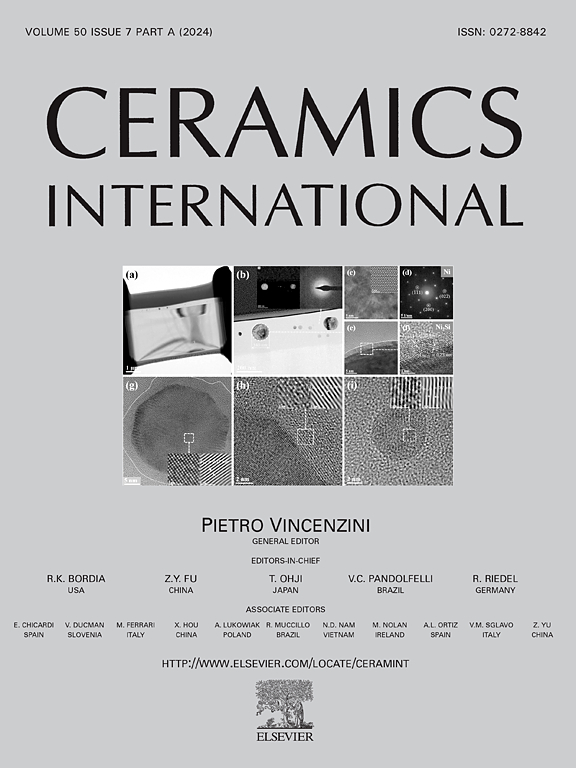Crystal growth of hydrated calcium silicate synthesized from fly ash and lime milk at 100 °C
IF 5.1
2区 材料科学
Q1 MATERIALS SCIENCE, CERAMICS
引用次数: 0
Abstract
To maximize the high-value application of fly ash, this study investigates the incorporation of amorphous silica derived from fly ash as a silicon source and lime milk as a calcium source into microporous calcium silicate powders through dynamic hydrothermal synthesis at 100 °C for a duration of 2 h or less. The products were collected at various synthesis intervals and analyzed using X-ray diffraction (XRD), scanning electron microscopy (SEM), Fourier-transform infrared spectroscopy (FT-IR), and thermogravimetric differential scanning calorimetry (TG-DSC). Results indicate that microporous calcium silicate forms through a dynamic reaction that disrupts Si-O bonds, enhancing the mobility of silica-oxygen tetrahedra and generating H2SiO4 2−groups. Ca2+ ions also interact with these bonds, resulting in Q1 and Q2 forms of silica-oxygen tetrahedra. Phase transformation of calcium silicate at various intervals was noted, beginning with 3CaO·2SiO2·3H2O, shifting to 2CaO·3SiO2·2.5H2O, and finally to CaO·2SiO2·2H2O at 90 min. Thus, microporous calcium silicate evolves from an amorphous C-S-H gel into a crystalline form, featuring diverse calcium silicate minerals with calcium-silicon ratios and particle sizes between 10 and 20 μm, with sizes increasing until the 80-min.
粉煤灰和石灰乳在 100°C 下合成的水合硅酸钙的晶体生长
为了最大限度地实现粉煤灰的高价值应用,本研究探讨了将粉煤灰中提取的无定形二氧化硅作为硅源,石灰乳作为钙源,通过 100°C 动态水热合成法,在 2 小时或更短时间内将其掺入微孔硅酸钙粉末中。在不同的合成间隔收集产物,并使用 X 射线衍射 (XRD)、扫描电子显微镜 (SEM)、傅立叶变换红外光谱 (FT-IR) 和热重差示扫描量热法 (TG-DSC) 进行分析。结果表明,微孔硅酸钙是通过动态反应形成的,这种反应破坏了硅-O 键,增强了硅氧四面体的流动性,并产生了 H2SiO4 2-基团。Ca2+ 离子也与这些键相互作用,形成 Q1 和 Q2 形式的硅氧四面体。硅酸钙在不同的时间间隔内发生相变,开始为 3CaO-2SiO2-3H2O,然后转变为 2CaO-3SiO2-2.5H2O,最后在 90 分钟时转变为 CaO-2SiO2-2H2O。因此,微孔硅酸钙从无定形的 C-S-H 凝胶演变成结晶形态,具有多种硅酸钙矿物,钙硅比和粒度在 10 至 20 μm 之间,粒度在 80 分钟之前不断增大。
本文章由计算机程序翻译,如有差异,请以英文原文为准。
求助全文
约1分钟内获得全文
求助全文
来源期刊

Ceramics International
工程技术-材料科学:硅酸盐
CiteScore
9.40
自引率
15.40%
发文量
4558
审稿时长
25 days
期刊介绍:
Ceramics International covers the science of advanced ceramic materials. The journal encourages contributions that demonstrate how an understanding of the basic chemical and physical phenomena may direct materials design and stimulate ideas for new or improved processing techniques, in order to obtain materials with desired structural features and properties.
Ceramics International covers oxide and non-oxide ceramics, functional glasses, glass ceramics, amorphous inorganic non-metallic materials (and their combinations with metal and organic materials), in the form of particulates, dense or porous bodies, thin/thick films and laminated, graded and composite structures. Process related topics such as ceramic-ceramic joints or joining ceramics with dissimilar materials, as well as surface finishing and conditioning are also covered. Besides traditional processing techniques, manufacturing routes of interest include innovative procedures benefiting from externally applied stresses, electromagnetic fields and energetic beams, as well as top-down and self-assembly nanotechnology approaches. In addition, the journal welcomes submissions on bio-inspired and bio-enabled materials designs, experimentally validated multi scale modelling and simulation for materials design, and the use of the most advanced chemical and physical characterization techniques of structure, properties and behaviour.
Technologically relevant low-dimensional systems are a particular focus of Ceramics International. These include 0, 1 and 2-D nanomaterials (also covering CNTs, graphene and related materials, and diamond-like carbons), their nanocomposites, as well as nano-hybrids and hierarchical multifunctional nanostructures that might integrate molecular, biological and electronic components.
 求助内容:
求助内容: 应助结果提醒方式:
应助结果提醒方式:


